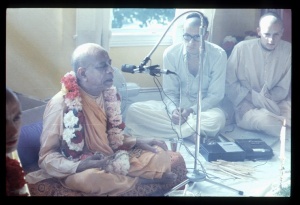SB 4.13.44: Difference between revisions
m (1 revision(s)) |
(Vanibot #0018 edit: make synonym terms in Sanskrit italic in SB - Vanisource) |
||
| Line 1: | Line 1: | ||
{{info | {{info | ||
|speaker=King | |speaker=King Aṅga | ||
|listener=King | |listener=King Aṅga thinking to himself | ||
}} | }} | ||
[[Category:Srimad-Bhagavatam - Canto 04 Chapter 13]] | |||
[[Category:Bhagavatam Verses Spoken by Anga Maharaja - Vanisource|041344]] | |||
<div style="float:left">'''[[Srimad-Bhagavatam]] - [[SB 4|Fourth Canto]] - [[SB 4.13: Description of the Descendants of Dhruva Maharaja|Chapter 13: Description of the Descendants of Dhruva Mahārāja]]'''</div> | |||
<div style="float:right">[[File:Go-previous.png|link=SB 4.13.43]] '''[[SB 4.13.43]] - [[SB 4.13.45]]''' [[File:Go-next.png|link=SB 4.13.45]]</div> | |||
{{RandomImage}} | |||
==== TEXT 44 ==== | ==== TEXT 44 ==== | ||
<div | <div class="verse"> | ||
yataḥ pāpīyasī kīrtir | :yataḥ pāpīyasī kīrtir | ||
adharmaś ca mahān nṛṇām | :adharmaś ca mahān nṛṇām | ||
yato virodhaḥ sarveṣāṁ | :yato virodhaḥ sarveṣāṁ | ||
yata ādhir anantakaḥ | :yata ādhir anantakaḥ | ||
</div> | </div> | ||
| Line 16: | Line 22: | ||
==== SYNONYMS ==== | ==== SYNONYMS ==== | ||
<div | <div class="synonyms"> | ||
''yataḥ''—on account of a bad son; ''pāpīyasī''—sinful; ''kīrtiḥ''—reputation; ''adharmaḥ''—irreligion; ''ca''—also; ''mahān''—great; ''nṛṇām''—of men; ''yataḥ''—from which; ''virodhaḥ''—quarrel; ''sarveṣām''—of all people; ''yataḥ''—from which; ''ādhiḥ''—anxiety; ''anantakaḥ''—endless. | |||
</div> | </div> | ||
| Line 23: | Line 29: | ||
==== TRANSLATION ==== | ==== TRANSLATION ==== | ||
<div | <div class="translation"> | ||
A sinful son causes a person's reputation to vanish. His irreligious activities at home cause irreligion and quarrel among everyone, and this creates only endless anxiety. | A sinful son causes a person's reputation to vanish. His irreligious activities at home cause irreligion and quarrel among everyone, and this creates only endless anxiety. | ||
</div> | </div> | ||
| Line 30: | Line 36: | ||
==== PURPORT ==== | ==== PURPORT ==== | ||
<div | <div class="purport"> | ||
It is said that a married couple must have a son, otherwise their family life is void. But a son born without good qualities is as good as a blind eye. A blind eye has no use for seeing, but it is simply unbearably painful. The King therefore thought himself very unfortunate to have such a bad son. | It is said that a married couple must have a son, otherwise their family life is void. But a son born without good qualities is as good as a blind eye. A blind eye has no use for seeing, but it is simply unbearably painful. The King therefore thought himself very unfortunate to have such a bad son. | ||
</div> | </div> | ||
__NOTOC__ | |||
<div style="float:right; clear:both;">[[File:Go-previous.png|link=SB 4.13.43]] '''[[SB 4.13.43]] - [[SB 4.13.45]]''' [[File:Go-next.png|link=SB 4.13.45]]</div> | |||
__NOTOC__ | |||
__NOEDITSECTION__ | |||
Revision as of 22:06, 30 November 2017

A.C. Bhaktivedanta Swami Prabhupada
TEXT 44
- yataḥ pāpīyasī kīrtir
- adharmaś ca mahān nṛṇām
- yato virodhaḥ sarveṣāṁ
- yata ādhir anantakaḥ
SYNONYMS
yataḥ—on account of a bad son; pāpīyasī—sinful; kīrtiḥ—reputation; adharmaḥ—irreligion; ca—also; mahān—great; nṛṇām—of men; yataḥ—from which; virodhaḥ—quarrel; sarveṣām—of all people; yataḥ—from which; ādhiḥ—anxiety; anantakaḥ—endless.
TRANSLATION
A sinful son causes a person's reputation to vanish. His irreligious activities at home cause irreligion and quarrel among everyone, and this creates only endless anxiety.
PURPORT
It is said that a married couple must have a son, otherwise their family life is void. But a son born without good qualities is as good as a blind eye. A blind eye has no use for seeing, but it is simply unbearably painful. The King therefore thought himself very unfortunate to have such a bad son.